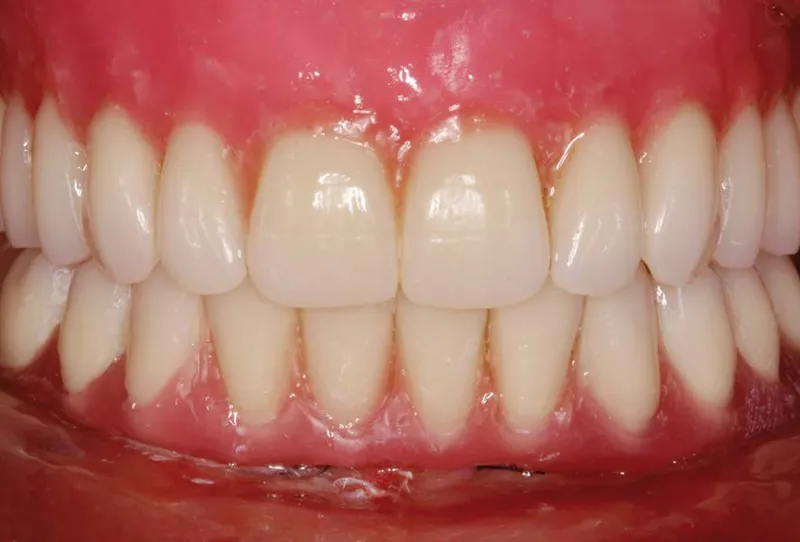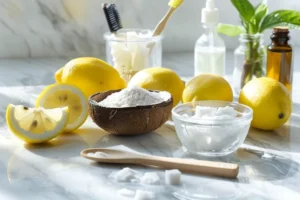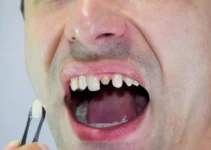Exploring methods for brightening your smile can lead you to a variety of home-based solutions. From baking soda mixtures to hydrogen peroxide applications, the options are vast. However, understanding the effectiveness and safety of each method is crucial in order to achieve optimal results without damaging your enamel. This article delves into popular techniques, shedding light on how they work and offering advice on maintaining oral health while pursuing a whiter, brighter smile from the comfort of your home.
Common Natural Ingredients for Teeth Whitening
In the quest for a brighter smile, many individuals turn to natural ingredients for teeth whitening. These ingredients are often more affordable and perceived as safer alternatives to commercial whitening products. While their effectiveness can vary, several natural substances have gained popularity due to their potential whitening properties. Let’s explore some of the most common natural ingredients used for teeth whitening.
It’s important to note that while these natural remedies can help remove surface stains, they might not be as effective as professional dental treatments. Always consult with a dentist before trying any new whitening method to ensure it’s safe for your teeth and gums.
Baking Soda and Hydrogen Peroxide
Baking soda and hydrogen peroxide are perhaps the most well-known natural teeth whitening agents. Baking soda is a mild abrasive that can help scrub away surface stains on your teeth. It also creates an alkaline environment in the mouth, which can inhibit the growth of bacteria. Hydrogen peroxide is a natural bleaching agent that has been used for years in teeth whitening products. When combined with baking soda, it can create a paste that helps remove stains and whiten teeth. To use, mix a small amount of hydrogen peroxide with baking soda to form a paste, and then brush your teeth with it for a few minutes. However, be cautious not to use this mixture too frequently, as it can lead to tooth sensitivity and enamel erosion.
Studies have shown that toothpaste containing baking soda and hydrogen peroxide is more effective at whitening teeth than standard non-whitening toothpaste. However, it’s essential to use these ingredients in moderation to avoid damaging your tooth enamel.
Apple Cider Vinegar
Apple cider vinegar (ACV) is another natural option that some people use for teeth whitening. Its acidic nature helps break down plaque and other substances stuck on your teeth, potentially providing a whitening effect. However, its high acidity can also erode tooth enamel if used too frequently.
To use ACV for teeth whitening, dilute it with water and swish it around your mouth for a few seconds before spitting it out. It’s crucial to rinse your mouth thoroughly with water afterward to remove any remaining vinegar. Additionally, wait at least 30 minutes before brushing your teeth to prevent enamel erosion.
Research suggests that while ACV may be effective in removing surface stains, its acidic properties could harm your dental health if not used cautiously. Therefore, it’s recommended to limit the use of ACV for teeth whitening and to always dilute it with water.
Activated Charcoal
Activated charcoal is a trendy ingredient in the world of natural teeth whitening. Made from oxidized substances like coconut shells or wood, activated charcoal is known for its highly absorbent properties, which can help remove surface stains and toxins from the teeth.
To use activated charcoal for teeth whitening, dip a wet toothbrush into the charcoal powder and gently brush your teeth for a couple of minutes. Rinse thoroughly to remove the charcoal residue. While some people report positive results, there is limited scientific evidence to support the efficacy and safety of activated charcoal for teeth whitening.
Some experts caution that the abrasive nature of activated charcoal might wear down tooth enamel if used excessively. It’s essential to use it sparingly and consult with a dentist before incorporating it into your oral care routine.
In conclusion, while these natural ingredients have gained popularity for their potential teeth whitening effects, it’s important to approach them with caution and not overuse them. For more information on oral health and safe whitening methods, be sure to check out our other articles.
Home Remedies to Avoid
While there are numerous home remedies touted to improve dental health, not all of them are beneficial. In fact, some can cause more harm than good. This section will explore a few common home remedies that you should avoid to maintain optimal oral health.
Here, we will discuss the potential dangers of using lemon juice, strawberry paste, and overusing baking soda on your teeth. Although these ingredients are natural and often found in kitchens, they can be detrimental to your dental health when used incorrectly.
Lemon Juice
Lemon juice is often praised for its vitamin C content and its supposed ability to whiten teeth. However, it is highly acidic, which can erode tooth enamel over time. Enamel erosion leads to increased tooth sensitivity and a higher risk of tooth decay.
A study published in the *Journal of Clinical and Medical Research* indicates that regular exposure to acidic substances like lemon juice can significantly reduce enamel hardness. This makes your teeth more vulnerable to cavities and discoloration.
If you’re tempted to use lemon juice for whitening purposes, it’s crucial to understand that the short-term gains are not worth the long-term damage. It’s far better to opt for professional whitening treatments which are designed to be safe for enamel.
Strawberry Paste
Strawberry paste is another popular home remedy for teeth whitening. While strawberries contain malic acid, which can help remove surface stains, they also have natural sugars and acids that can harm your teeth.
A report in the *Dental Journal* found that applying strawberry paste directly to the teeth can lead to acid erosion and weaken the enamel. Over time, this makes teeth more susceptible to staining and decay, essentially counteracting any whitening benefits you might experience initially.
Furthermore, after using strawberry paste, many people do not rinse or brush their teeth properly, allowing the acids and sugars to linger and cause additional damage. It’s important to avoid such practices and consult a dentist for safe and effective whitening solutions.
Overuse of Baking Soda
Baking soda is often marketed as a natural teeth-whitening agent, thanks to its mild abrasive properties. While it can remove surface stains, overusing it can be detrimental to your enamel.
A study in the *Journal of Dentistry* determined that excessive use of baking soda can lead to micro-abrasions on the tooth surface. These small scratches weaken the enamel and make it easier for plaque and bacteria to adhere to your teeth, ultimately leading to more significant dental issues.
Moreover, baking soda does not fight against oral bacteria or cavities. It should never be used as a replacement for fluoride toothpaste, which is specifically formulated to protect the teeth against decay. Using it too frequently can also disrupt the natural pH balance of your mouth, encouraging bacterial growth.
It’s essential to use baking soda sparingly and under the guidance of a dental professional. For those looking for whitening solutions, over-the-counter products approved by dental associations are a safer bet.
These home remedies might seem harmless, but the potential damage they can cause to your teeth outweighs any perceived benefits. If you’re looking to improve your dental health, it’s always best to consult a dental professional. For more insights into oral care and safe treatments, check out our other articles.
Tips for Maintaining White Teeth After Treatment
Achieving a bright, white smile is a fantastic confidence booster, but maintaining that radiance requires ongoing effort. By following specific practices, you can ensure your teeth stay as white as possible long after your treatment. It’s essential to adopt a diligent oral hygiene routine and make mindful dietary choices.
While professional teeth whitening treatments can significantly improve the appearance of your smile, their longevity largely depends on how well you maintain your oral health. Here are some vital tips to help you keep your teeth white and your smile brilliant.
Proper Oral Hygiene Practices
One of the most effective ways to maintain white teeth is through proper oral hygiene. This involves brushing your teeth at least twice a day with a fluoride toothpaste. Fluoride not only helps in maintaining the whiteness but also strengthens the enamel, making your teeth more resistant to stains and decay. Using an electric toothbrush can be more effective than a manual one, as it can cover more surface area and remove more plaque and surface stains. Additionally, flossing daily is crucial. It removes food particles and plaque from areas your toothbrush can’t reach, thus preventing stains and contributing to overall oral health.
Mouthwash can also play a supportive role. A whitening mouthwash can help in removing surface stains and reducing the risk of plaque build-up. Using a mouthwash with antibacterial properties can be doubly beneficial, as it helps in maintaining oral health and keeping your breath fresh.
Consider the following practices for optimal oral hygiene:
- Brush your teeth for at least two minutes, twice daily.
- Use fluoride toothpaste and an electric toothbrush.
- Floss daily to remove plaque from between your teeth.
- Rinse with a whitening or antibacterial mouthwash.
By incorporating these oral hygiene practices into your daily routine, you can significantly extend the life of your teeth whitening treatment. For more tips and insights on maintaining your oral health, be sure to check out our other articles.
FAQs on Whitening Teeth at Home
Here are some commonly asked questions about how to achieve a brighter smile from the comfort of your home.
What are some effective natural methods to whiten teeth at home?
There are several natural methods to help whiten teeth at home which include baking soda and hydrogen peroxide paste, oil pulling with coconut oil, and using apple cider vinegar as a mouth rinse. However, it’s important to use these remedies cautiously and to not expect instant results. Consistency and maintaining good oral hygiene are key factors in seeing improvement over time.

My name is Salman Kapa, a 73-year-old expert in bone regeneration and dental implantology. With decades of experience in the field, I am dedicated to advancing our understanding of oral health and hygiene. Through my research and writing, I aim to contribute to the development of innovative solutions in dental care.




